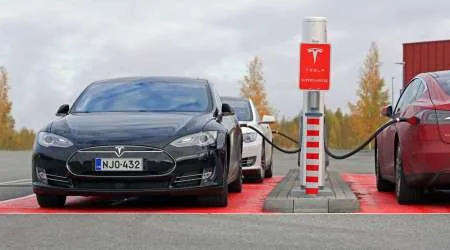Have we got the power?
As an electric car, the Tesla relies on being able to find "Supercharger" stations to ensure you have enough power to complete long-distance journeys. The map below shows where you can find those charging stations across Australia as of April 2016, including Tesla's own Superchargers, "patron" sites such as hotels and resorts which only allow charging for visitors, and Airbnb locations with dedicated chargers. Right now, 22% of Australia's area is covered.
Key facts to know about your Tesla:
- According to Tesla, charging between 10% to 80% at a Supercharger will provide you with enough charge to travel to another Supercharger on the network.
- You’ll need 75 minutes to get a Tesla S to full charge using a Supercharger but only 40 minutes for 80% charge
- After charging at a Tesla Supercharger for half an hour, you can can travel 270km.
- 320,000 reservations have been made for the Tesla 3 globally.
New cars are introduced to the public every day, but when the Tesla Model 3 was released it was different. That's because there is nothing normal about Tesla.
Heath Walker, senior marketing and communication manager at Tesla, explained to us how the company is prioritising the Supercharger rollout. "We want to connect major cities based on sales and where we are operational and then branch from there. We are also putting in place a Destination Charging program where hotels, shopping centres, airports and secure parking locations receive high power wall connectors for charging of the Model S," he said.In the US, the Supercharger network is much more advanced, which Walker says is due to a few key factors.
"The US has built infrastructure as the population of vehicles have been adopted. In addition, they launched the Model S in 2012. This being said, 90-95% of charging is done at home, and Superchargers are for long-distance travel which we have enabled in the two major cities where we are operational."

Tesla aims to "cover Australia in superchargers," according to Walker, which he said should not stop anyone from purchasing a Tesla within 500km of range of the Supercharger network.
Range anxiety, or the fear of losing charge and being nowhere near a charger, is an issue often discussed by Australian Tesla enthusiasts. Tesla's focus has been on the east coast, with all major cities planned to be connected this year. However, the next phase of its plan, which may or may not involve the introduction of more Superchargers on the west coast of Australia, is yet to be announced.
While range anxiety is very real, Walker says the solution is about changing behaviour.
"Range anxiety was introduced by petrol vehicles. Every time the red light comes on in a vehicle, that is range anxiety. Owning an electric car is like owning a mobile phone, you get home, charge, and wake up with the equivalent of a full tank of petrol every morning. And nobody fills up twice in a day unless driving long distances, which is where Superchargers come into play."
Superchargers provide 270km of range with 30 minutes of charging time. Based on a Model S, you would need to charge for 75 minutes to get the car to full battery, but Tesla estimates only 10-80% of charge is needed to travel between most Supercharger locations.
Finder survey: Would Australians in different states consider a green car loan to buy an EV?
| Response | WA | VIC | SA | QLD | NSW |
|---|---|---|---|---|---|
| No | 55.93% | 63.82% | 62.67% | 61.9% | 56.98% |
| Yes | 44.07% | 36.18% | 37.33% | 38.1% | 43.02% |
Data for ACT, NT, TAS not shown due to insufficient sample size. Some other states may also be excluded for this reason.
Popular searches on Finder
Popular car loans
Other searches on Finder
Picture: Taina Sohlman / Shutterstock.com
More guides on Finder
-
Car loans for classic cars
Want to buy a classic car but don't have the ready money? There are still financing options available for classic vehicles. Find out what loans you have to choose one and which one will work best for you.
-
How much should you spend on a new car?
Find out the effective rule for buying cars in your price range.
-
Tesla buying guide
If you're looking at purchasing a Tesla – Model S, Model X or Model 3 – this guide will show you how to choose a vehicle and make your purchase.
-
How do you sell a car under finance?
Read the guide on how to sell an encumbered vehicle to find out the extra steps involved.
-
How Uber car loans can help you get on the road
Need a new loan for your next Uber car? Find out what is on offer here.
-
IMB New Car Loan
Read our review on the IMB offers a competitive fixed with its New Car Loan to help you finance a new car or one that's up to two years old, and find out if you're eligible to apply today.
-
Fully Maintained Novated Lease
A fully maintained novated lease is a popular way of salary packaging a car and its operating costs, enabling employees to easily afford a car that suits their needs. Under such a lease, an employee will be able to choose a car of their choice and have control over its use and maintenance while paying affordable monthly repayments from their pre-tax salary.
-
Caravan Loan Calculator 2024
It can be difficult to know just how much a caravan loan is going to cost you. Find out just how much you'll really repay using our caravan loan calculator.
-
Secured Car Loans
If you're looking to a buy a car you can consider a secured car loan to help finance your vehicle purchase. The loan is guaranteed so you can enjoy a lower interest rate – compare your options and apply today.
Ask a question

I have 2 destination Chargers installed. I will receive my model 3shortly. What will I need to be able to charge it?
Hi Warren,
Thanks for your inquiry.
The NEMA 14-50 charger for Tesla electric cars plugs into a 240-volt wall outlet, similar to the type used by your clothes dryer or other appliances. A standard Tesla charger with a NEMA 14-50 connector will be able to charge your Tesla battery completely in 10 hours (for the Model S)
Hope this helps! For any further questions, feel free to reach out to us again, we’re here to help.
Best,
Nikki
Hi I wondering how to go about installing a charging station. I have a car wash business in Gippsland on a main highway and thought this would be something that would enhance our business.
If you could get back to me that would be great.
Thanks
Hi Janine,
Thank you for reaching out to finder.
Though finder is a comparison website that assists users on our guides and articles, you may want to contact companies that offer the equipment needed to start a charging station business like Telstra or Chargefox. This way, they may check if your location is suitable for having a charging station built. Hope this helps!
Cheers,
Reggie
Would battery swap stations ever be considered by Tesla to its customers. These could be of course be labelled and so could be tracked for its owners to determine lifetime etc. Or is that not practical ?
Hi Vince,
Thank you for reaching out to finder.
There are a lot of reviews as well as comments regarding this from users in the internet. But nothing tangible as of yet regarding making this a reality by Tesla. We may check on future updates from Tesla if this is something that they could queue up in the pipeline. Hope this helps!
Cheers,
Reggie
I regularly drive from Canberra to Bendigo in Victoria. It is a distance of 630 km for a very large part of the trip along the Hume Highway. I travel at 110 km/h with the air conditioner on. Quite often it is very hot and in Australian conditions this is absolutely necessary. The range of my vehicle is 850 km so I can get there without needing to refuel. Typically we stop at Wodonga for lunch for about 45 minutes. If I were to buy a Tesla S how would it compare?
Hi Mike,
Thanks for your inquiry
The Model S record for consumption is 118 miles per gallon (MPGe). When traveling, the fewer stops you make, the more fuel you save. WE also have to take note that the average price for petrol 118.0 cents per liter. With an EV, the average electricity price is 36.12 cents per kilowatt. This alone makes driving an EV much more cost effective than a petrol-operated car. You may also visit Tesla’s website for information about the experiences of Tesla S owners and insights on how the car compares with gas powered vehicles.
Hope this information helps
Cheers,
Arnold
Can you advise the typical motor speed of a Tesla when driving at 100 Km/h.
Regards.
Peter Cull.
Hi Peter,
The motor RPM range of an electric car is very different to that of a regular petrol/diesel engine. In the Model S Tesla, the minimum RPM is zero at standstill and approx. 18,000 RPM at maximum speed, electronically limited to 255 km/h.
My calculation suggests that at 100 km/h, the motor would be spinning at roughly 7,050 RPM.
The motor drives the wheels through a (approx.) 9:1 reduction gear.
I hope this helps.
Kind regards,
Philip.
Hi Peter,
Thanks for your inquiry.
On average, the engine of a car moving 100kph will normally spin at 2000 – 2800 rpm. This figure depends on the make and model of the vehicle. Also factors like weather, engine condition, vehicle maintenance etc. These are all factors that affect the performance of the engine.
Hope this information helped.
Cheers,
Arnold